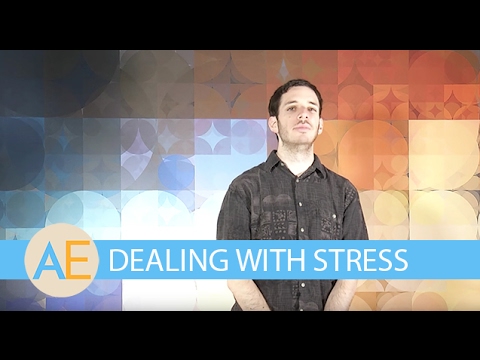17 Science-Backed Ways to Relieve Stress Right Now!
stress
‘Buying time’ and not just things may increase life satisfaction
“Using money to free-up time is linked to increased happiness,” BBC News reports. Researchers surveyed people from a number of developed countries and found those who reported using money to free up time, such as hiring a cleaner, tended to report higher life satisfaction.
Researchers surveyed more than 6,000 participants from the US, Canada, Denmark and The Netherlands, including around 800 Dutch millionaires, about “buying time” – which was defined as paying people to do chores that participants personally found unenjoyable. Researchers found that, regardless of income, people who bought time reported better life satisfaction.
A further small experiment found that spending money on time-saving purchases rather than material goods such as wine and clothes was associated with increased happiness and positive feelings and reduced feelings of “time stress”.
However, due to the complex web of factors that affect our wellbeing, it is difficult to say that this study proves that “buying time” makes you more satisfied with your life.
Prioritising time over money and material goods may well be one route to happiness, but it may not work for everyone.
Of course not everyone can afford to hire a cleaner (or in the case of a Dutch millionaire, a butler). However there are techniques you can use that may help you manage your time more effectively.
Read more advice about time management.
Where did the story come from?
The study was carried out by researchers from Harvard Business School in the US, University of British Columbia in Canada, and Maastricht University and Vrije Universiteit Amsterdam, both in The Netherlands.
The study was funded by Public Scholars Initiative at the University of British Columbia, the Social Sciences and Humanities Research Council of Canada, the Society for Personality and Social Psychology Heritage Foundation, and the Society for Personality and Social Psychology Q&pAy Initiative.
The study was published in the peer-reviewed medical journal PNAS on an open-access basis, meaning it is freely available online.
The UK media’s reporting of the study’s findings wasn’t accurate, as it failed to point out that the study is not able to prove cause and effect. There could have been multiple other reasons why some people reported greater life satisfaction.
For example, the headline in the print edition of the Daily Mail: “The secret behind true happiness? Hire a cleaner” is not representative of the findings of the study.
What kind of research was this?
This research involved multiple cross-sectional studies using questionnaires. There was also a small experimental study, randomising people to spend $40 (around £30 at time of writing) on material goods one weekend and time-saving purchases another weekend and then asking them about their level of stress and happiness.
Using a questionnaire is a good way of including a lot of people and in this case allowed researchers to easily look at participants’ answers from four countries. However, this can only tell us what their levels of perceived happiness and satisfaction are in relation to the “ladder of life rung” they are on at one time point. It is likely other factors such as job, relationships and health status would have more of an effect on these perceptions, but none of these were taken into account.
The additional experimental component added little weight to their argument as again they did not take into account any other potential confounding factors.
What did the research involve?
Researchers carried out questionnaires with 6,271 participants from the US, Canada, The Netherlands (including a sample of 800 millionaires) and Denmark to investigate the effect of buying time on life satisfaction. They also conducted an experimental study to test the results of the questionnaire.
The researchers firstly carried out surveys involving questions about how much money, if any, people spend every month to free up their time by paying someone else to complete daily tasks they do not find enjoyable. They were also asked about their satisfaction with life through two questions: “Taking all things together, how happy would you say you are?”, and where they currently stand on a ladder spanning from the worst possible to best possible life imaginable.
Participants also answered questions on potentially confounding factors, including:
annual household income
number of hours worked each week
age
marital status
number of children living at home
the amount spent on groceries, material and experiential purchases (buying an “experience” such as a night out at the theatre), to account for the fact that decisions to spend money on time-saving purchases might be a reflection of income
In the Canadian and Dutch surveys, participants also reported a measure of “time stress”. This includes stating how much they agreed with statements such as “I feel pressed for time today”, “Compared to yesterday, I feel more stressed out about my time”, and “Time is my scarcest resource”.
The researchers then carried out an experiment on 60 Canadian working adults. They were asked to spend the equivalent of £30 on two consecutive weekends; on one weekend they were randomly assigned to purchase something that would save them time and on the other weekend, a material purchase.
After making each purchase, participants received a phone call at 5pm to report their feelings of positive or negative mood and time stress on that particular day.
What were the basic results?
Across samples from all included countries, 28.2% of participants spent money to buy themselves time each month with a mean spend of $147.95 US dollars per month in those who “bought time”.
When controlling for variables, those who spent money in this way reported slightly better life satisfaction than those who did not. This effect was not altered by wealth or income.
The researchers then considered a broader definition of time-saving purchases, to cover any way a respondent might spend money to provide more free time.
Of a sample of 1,802 US working adults, 50% reported spending money in this way, with most buying their way out of cooking, shopping and household maintenance.
Again, when controlling for variables, those who spent money in this way reported slightly better life satisfaction, when controlling for the amount spent on groceries, material goods and experiences.
In the experiment phase of the research:
Participants reported a greater end of the day positive mood on a 12-item scale after making a time-saving purchase versus material purchase.
Participants reported a lower end of the day negative mood on a 12-item scale after making a time-saving purchase versus material purchase.
Participants reported lower feelings of time stress after making a time-saving purchase versus material purchase.
How did the researchers interpret the results?
The researchers concluded that “across several distinct samples, including adults from Canada, the United States, Denmark, The Netherlands, and a large sample of Dutch millionaires, buying time was linked to greater life satisfaction. These results held controlling for a wide range of demographics, as well as for the amount that respondents spent on groceries and material and experiential purchases each month. These results were not moderated by income, suggesting that people from various socioeconomic backgrounds benefit from making time-saving purchases.”
Conclusion
This large multi-country study on adults of various incomes found that buying time was linked to greater life satisfaction, even when considering a wide range of demographics and spend on other items each month. It also seemed to show that people were in a better mood when buying something that saved them time versus buying something material.
These results are interesting in the busy, time-pressured culture many of us face today. The researchers suggest using money to buy time may reduce feelings of time pressure and buffer against negative effects of time pressure on life satisfaction.
While this may be the case, before you start giving up all household chores, you might want to consider some limitations to the research:
These were mainly cross-sectional studies with responses given at one time point. This means they cannot show that paying people to do tasks for you improves life satisfaction or happiness. Both will be dependent on a variety of factors that were not taken into account, such as employment, work/life balance, social situation, family life, personality and health status.
For the small experimental study, the researchers did not look at what other activities or events were occurring on those two particular weekends that may have affected mood and stress levels rather than what they had purchased. In addition, the participants knew what the money was being spent on, which could have biased the results.
Participants self-reported their activities. It might be that not all wanted to admit that they pay other people for housework.
Participants also self-reported life satisfaction. People might want to seem like they are happier with their life to justify paying someone to do housework, which might not necessarily be the case.
As the results showed, the question around paying money to free up time is subjective – some people might include paying for a ready-made lunch in this category whereas others might just think of paying other people to do housework as fitting into this definition.
The median age in the millionaires category was 68 compared with 30 in one of the US samples. This variation in age, as well as other factors such as number of children in the household, might mean people have different amounts of time to spend doing household chores so might be more or less stressed at the prospect of doing such activities.
If you are feeling “time stressed” there are time management techniques that can help as well as ways to help relieve feelings of stress.
Dealing with stress on the autism spectrum
Dealing with stress on the autism spectrum.
Stress Management for Multiple Sclerosis
How to Relax and Reduce Anxiety, Anytime, Anywhere
We are busy! Children, moving, new jobs, old jobs, unexpected situations, and circumstances beyond our control can lead to stress and anxiety, regardless of how prepared we are. Depending on what is going on in our lives, our stress levels can reach new heights. This can take a toll on both our mental and physical health. It needs to be controlled or better yet, stopped. Here are some things to try throughout the day to help ease your mind and body and regain your confidence and release anxiety.
Take a Deep Breath…
Breathing exercises are amazing. The infamous 4-7-8 breathing exercise is highly recommended and helps the individual not only calm themselves but helps lower their heart rates too. For four seconds, inhale through your nose. Hold your breath for seven seconds and then release it slowly for eight seconds. Repeat this exercise several times, or until you feel calmer and notice how your heart rate is a bit slower. This can be done throughout the day or in anticipation for important meetings, or other stressful situations.
Drink this Not That!
Herbal tea can be a life saver. Herbal teas are usually natural, plant-based teas that are known for their calming and soothing effects. Some promote sleepiness, and many people opt to drink them in the evenings in preparation for bedtime. Chamomile tea is one of the most popular relaxation teas. Not only can it ease stress and anxiety, but the teas also have properties that can help with muscle spasms as well as encourage a good night’s sleep.
Get Moving to Fight Stress
Exercise, and particularly yoga, can ease stress. Exercise increases our endorphin levels, which makes us happy! Doing some form of exercise whether it be a walk in the evening or an all-out weight lifting session is highly encouraged to decrease stress and anxiety. Physical release benefits both mind and body. Yoga is a type of meditation exercise that helps an individual feel grounded and centered when their life might be in complete chaos. It incorporates breathing exercises as well as stretching and is a favorite in reducing stress. The best thing about yoga is that it can be done almost anywhere if you have a mat on hand.
Ease the Tension with a Massage
Get a massage. Massages focus on the pressure to ease muscle tension and soreness. There are many different types to choose from including ones that involve hot rocks placed along your spine, Swedish massages, and deep-tissue massages to only name a few. Lactic acid is released during the muscle massages which not only makes us healthier; it also helps us relax. Drink lots of water to flush out the toxins massages release, and enjoy the relaxing benefits they provide.
Aromatherapy Can Be Done Anywhere
Apply essential oils to help you relax. Essential oils are another fantastic way to promote relaxation and less stress. There are oils specifically made to help anxiety and stress such as lavender oil or peppermint oil. They can be placed in a diffuser to inhale and enjoy the aromatherapy of the relaxing oils, or you can also take them to work or travel with them. By placing small amounts on your temples and wrists, the oil can be absorbed as well as inhaled for maximum benefits throughout the day, wherever you go.
The Sun is Your Friend
Head outdoors to beat stress. Often, taking a walk outside or reveling in nature and the beauty of your surroundings can give you a mental break from your workload or tasks. Taking the time to breathe deeply as you remove yourself from your office or home for a short time can lower anxiety and help regain your focus. Sometimes all we need is a change of scenery and focus to lower our stress levels.
Don’t let stress ruin your day. Utilizing one or many of these ideas throughout the day can help keep you calmer and happier. Essential oils can be carried with you anywhere, and breathing exercises can be done anytime you feel overwhelmed.
Bio: Sarah writes for Relax Everyday. Her goal is to share her knowledge about relaxation, massages, and meditation using tried and tested strategies to those who want to learn more about it.




